Who for us men and for our salvation came down from heaven and was incarnate of the Holy Spirit and the Virgin Mary and became Man.
Again this week we’ll have a dull (but important) beginning: three matters regarding language.
1 “For us men…” “…and became man.“
Is that sexist language? In today’s popular usage, yes, it is. I’m sure all here present know that the English word “man” once was understood by all to refer both to “mankind”, “humanity” * in general and also to males in particular. Today many believe “men” refers only to males.
- No matter what we do, we can’t seem to avoid “man“, can we?
The Greek word used in the Creed (“anthropos / ἄνθρωπος”) means “mankind”, “human“. …”τὸν δι’ ἡμᾶς τοὺς ἀνθρώπους” is “…who for us human beings“. Again at the end, “καὶ ἐνανθρωπήσαντα” means “and became human“. Christ was Incarnate for the sake of all mankind. He lived and died and rose again for all humanity. So should our translations of the Creed be changed to reflect this? That’s not for me to say.
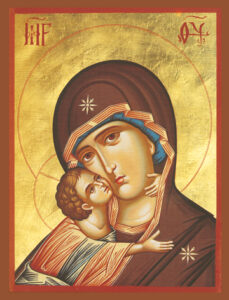
Does that mean it’s acceptable (as in that United Church of Christ statement of faith, mentioned in Part One) to avoid calling Jesus “He”? No way! In order to become Incarnate, Christ had to be born as either a male or a female Person. The New Testament is clear that He was (and is) male, always referred to as “He”. To deny that is to deny the Incarnation, to make Him into… I don’t know what. Something other than human.
from St. John the Forerunner Skete, Mt. Athos
Icons are used with permission of Saint Isaac’s Skete, skete.com
It’s past time to move on… …
No. It’s not.
I remember the first year I truly understood and believed in Christ’s Incarnation. Believe it or not, it wasn’t till I was in the first year of Methodist seminary.
In the kindly evangelical church where I grew up, people loved Jesus and talked a lot about Him, but I can’t remember anybody explaining Who He is. Probably I just wasn’t listening. In the Methodist campus church where I first “got religion”, I learned a lot about Jesus’ ethical teachings, which have guided my life, and have both kept me out of a lot of trouble and also got me into a lot of trouble.
But it was in theology class in seminary that Dr Philip Watson * taught us the Creed, and I believed. That first Christmas I was just overwhelmed by the wonder of it. In a way I envy those of you who grew up always believing, but in another way I wish you could discover Him afresh the way I did back in 1960.
- Though he was not Orthodox, “may his memory be eternal.” I pray for that dear man every day.
2 “And”
As you know, the Orthodox wording of the Creed says “and was incarnate of the Holy Spirit and the Virgin Mary…”
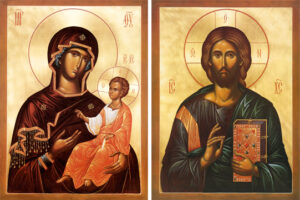 The Western Christian Creed reads “…and was incarnate by the Holy Spirit of the Virgin Mary…” That is a mistranslation. Jesus Christ is both fully God and fully Man, so the Virgin Mary should get equal billing here. Her contribution of her humanity to Christ’s Incarnation was just as important as God’s contribution of His divinity. That is why we honor and glorify the Theotokos frequently (to put it mildly) in our Orthodox services.
The Western Christian Creed reads “…and was incarnate by the Holy Spirit of the Virgin Mary…” That is a mistranslation. Jesus Christ is both fully God and fully Man, so the Virgin Mary should get equal billing here. Her contribution of her humanity to Christ’s Incarnation was just as important as God’s contribution of His divinity. That is why we honor and glorify the Theotokos frequently (to put it mildly) in our Orthodox services.
3 Figurative Language
Christ “came down from heaven…”
Did He really come down? No. The Creed is not a geography lesson. That’s figurative speech. * When speaking about God and His Kingdom, we have to use figurative language. Our words only point to things greater than human language can describe.
- We often use figurative language without noticing it: A child moves “up” from fifth grade to sixth. A politician “falls” from power.
Heaven is “up” in the sense that it’s superior to our world, better, greater. Coming “down” from Heaven, “ascending” into Heaven – these are the least inadequate words to describe where Christ came from.
What is important here is simply that in His mercy our Lord and God and Savior appeared on earth in the flesh to save us.
He was crucified for us under Pontius Pilate, and suffered and was buried; and He rose on the third day, according to the Scriptures.
Why is Jesus’ death not specifically mentioned in the Creed? I don’t know. (Can anyone more scholarly than I explain this?) His death is 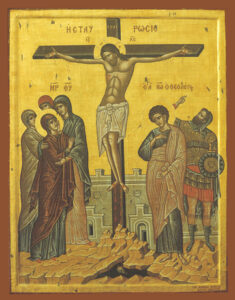 certainly assumed: The purpose of crucifixion was to put people to death. Dead people were buried, not live people. A few modern translations have phrased it “suffered death“, but the Greek says only that He “suffered”.
certainly assumed: The purpose of crucifixion was to put people to death. Dead people were buried, not live people. A few modern translations have phrased it “suffered death“, but the Greek says only that He “suffered”.
by Monk Michael of Athos, late 20th c
This omission would seem to call into question the later Western doctrine that the chief purpose of Christ’s Incarnation was that by His death He could “pay the price of our sins” so God wouldn’t have to send us to hell. That was not the ancient and Orthodox understanding of the Cross.
Christ’s Resurrection is mentioned. “The third day” means counting Holy Friday as the first day.
But why did Jesus have to be crucified? Why could He not have died a natural death? According to Saint Athanasius the Great it was because, being God in the flesh, He would not have died naturally. He had to be put to death, and it had to be done publicly so it would be clear that His Resurrection was not fraudulent. Therefore He had to be executed, and crucifixion was the form of execution Rome used for non-Romans. Did Jesus suffer? Horribly. (If you don’t know how crucifixion “worked”, look it up. I don’t want to talk about it.) His suffering and death were the sign of how much God loves us. “Whoever has seen me has seen the Father.” John 14:9 But that was not the chief reason for His death.
Christ died so He could be raised to a new kind of human life, the kind God intended for mankind from the beginning, before we fell into sin. Christ died so He could lead us His people into death with Him – our deaths, yours and mine – and through death with Him, and out the other side with Him, so that in His good time we can share that same fullness of new human life in Him. For “we shall be like Him”. 1 John 3:2
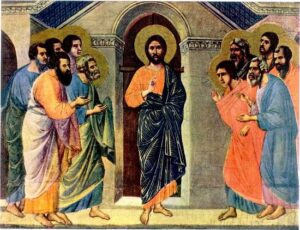 What was Christ’s Resurrection Body like? Genuinely physical, yet somehow without material limitations. On Pascha evening He walked with Luke and Cleopas on the road to Emmaus, ate with them, then “vanished“. On that same Pascha night, when His disciples were in the Upper Room, “though the doors were locked He came and stood among them” and ate and drank with them, and then just as suddenly was gone. A week later He appeared again, and Thomas touched His hands and side. John 20 What kind of “super-material” body was this? We don’t know. * But it must have been just a hint of what our resurrection bodies will be like.
What was Christ’s Resurrection Body like? Genuinely physical, yet somehow without material limitations. On Pascha evening He walked with Luke and Cleopas on the road to Emmaus, ate with them, then “vanished“. On that same Pascha night, when His disciples were in the Upper Room, “though the doors were locked He came and stood among them” and ate and drank with them, and then just as suddenly was gone. A week later He appeared again, and Thomas touched His hands and side. John 20 What kind of “super-material” body was this? We don’t know. * But it must have been just a hint of what our resurrection bodies will be like.
- Actually we don’t even know what “ordinary” matter really is. Atoms are composed almost entirely of space. Matter and energy are interchangeable. Is matter just another form of energy?
By His Incarnation, Death and Resurrection, Christ has transformed human death, made our deaths not “the end”, not our entrance into a world of shades and shadows and nothingness, but rather our entrance into new and better life in Him. Ever since Christ’s Death and Resurrection, those who believe in Him and follow Him no longer need fear death. That is why Saint Paul wrote “O Death, where is your sting? O Hades, where is your victory? …thanks be to God, who gives us the victory through our Lord Jesus Christ.” I Corinthians 15:55-57
And He ascended into heaven and is seated at the right hand of the Father;
Again, “ascended” is figurative language. Likewise, God the Father Who is pure Spirit has no “right hand”.
So what can this mean? Temember how James and John asked the Lord to seat them “at Your right and at Your left, when You come into Your Kingdom.” Mark 10:37 They wanted to be second and third in command, in His Glory. The Creed says that Christ is second in command, second in Glory to the Father. I think this affirms the Orthodox understanding of Christ’s relation to God the Father. The Father is the Source of all things. But both Christ and the Holy Spirit, though eternal and equal to the Father in essence, are in some indefinable way “subservient” (is that the right word?) to Him: Christ “begotten” of the Father, the Spirit “proceeding” from the Father.
He will come again with glory to judge the living and dead.
This world is a glorious place. This world is a horrible place. This world will not go on as it is forever. Jesus Christ will come again to set things right. Thank God!
Glory: Another indefinable word, although I suspect you knew what I meant by it in the paragraph above. In centuries past, most people understood glory better than we do, because they knew the majesty and glory of their kings and queens. The recent funeral of Queen Elizabeth II reflected a little of this former glory. I know I responded to it, was moved by it, because I recognized the glory, felt the glory. (I also know not all reacted that way.)
We have images of Heavenly Glory. For example, the angels at Christ’s birth filling the skies singing “Glory to God in the highest”.
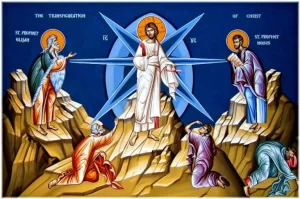 courtesy of Eastern Diocese of America, Serbian Orthodox Church
courtesy of Eastern Diocese of America, Serbian Orthodox Church
And Christ’s Transfiguration when He was shown in Glory, radiant with light brighter than His disciples could bear to look at, yet somehow they could see Him with Moses and Elijah. Saint Seraphim of Sarov, radiant with light as he and his disciple walked on a winter night in the Russian forest. And for those who have eyes to see and ears to hear, God’s Glory shines forth in our Orthodox worship.
Judgment: He will come “to judge the living and the dead”, to judge all who have ever lived from the beginning of time till the end – and that will be The End.
Would we rather there be no judgment?
Well, would we really want the world to go on forever as it is now, where the evil so often triumph and the innocent so often suffer? Would we really want the evil to get away with it, and never get their “reward”? Would we really not want goodness to be rewarded? so that it made no difference whether or not we tried to be good, tried to follow Christ?
Many early Christians eagerly hoped Christ would return soon. “Even so, come Lord Jesus.” Revelation 22:20
His Kingdom shall have no end.
I think the least dangerous forms of human government are a republic or a democracy – “if you can keep it”, as Ben Franklin may or may not have said. Kingdoms are very much out of fashion these days. The few remaining royalty in the world have little or no power. I have no issue with that.
A genuine old fashioned powerful benevolent king or queen (or even an autocrat) would be great. He or she would get a lot of good things done quickly. However, get a bad one (Diocletian, Ivan the Terrible, Hitler, Stalin, and now Putin), and we all know what happens.
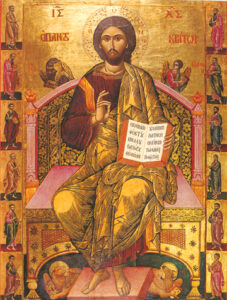 But try to imagine an utterly benevolent King, who loves His people, defends them, leads them into all good things, who Himself sets the example for them. A Kingdom ordered so that there can be complete freedom for each of us, because all choices will be good ones. That is the Kingdom of Christ our God.
But try to imagine an utterly benevolent King, who loves His people, defends them, leads them into all good things, who Himself sets the example for them. A Kingdom ordered so that there can be complete freedom for each of us, because all choices will be good ones. That is the Kingdom of Christ our God.
Now, try to imagine yourself living in such a Kingdom, what life would be like – no, will be like. We who love the Lord Jesus live even now in the outskirts of His Kingdom, and we can sometimes have a foretaste of what life is like there. How? I can’t explain it. But it happens.
And finally, try to imagine living forever in His Kingdom “that shall have no end”.
That was first promised to King David by his court prophet Nathan: “When your days are fulfilled and you rest with your fathers, I will set up your seed after you, who will come from your body, and I will establish his kingdom. He shall build a house for My name, and I will establish the throne of his kingdom forever. I will be his Father, and he shall be My son. … And your house and your kingdom shall be established forever before you. Your throne shall be established forever.” 2 Samuel 12:7-16
And in Daniel’s vision: “I was watching in the night visions, and behold, One like the Son of Man, coming with the clouds of heaven! He came to the Ancient of Days, and they brought Him near before Him. Then to Him was given dominion and glory and a kingdom, that all peoples, nations, and languages should serve Him. His dominion is an everlasting dominion, which shall not pass away, and His kingdom the one which shall not be destroyed.” Daniel 7:13-14
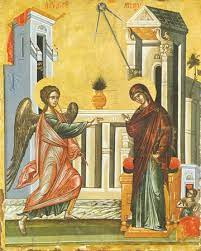 And in the words of Archangel Gabriel to the Virgin Mary: “You will conceive in your womb and bring forth a Son, and shall call His name Jesus. He will be great, and will be called the Son of the Highest; and the Lord God will give Him the throne of His father David. And He will reign over the house of Jacob forever, and of His kingdom there will be no end.” Luke 1:31-33
And in the words of Archangel Gabriel to the Virgin Mary: “You will conceive in your womb and bring forth a Son, and shall call His name Jesus. He will be great, and will be called the Son of the Highest; and the Lord God will give Him the throne of His father David. And He will reign over the house of Jacob forever, and of His kingdom there will be no end.” Luke 1:31-33
Saint George the Cretan, 16th c
What will your future be like if you accept Christ’s promise, and try to be faithful to Him and His commands? I know no better attempt to imagine it than the one I quoted a while back from the end of C.S. Lewis’ Chronicles of Narnia: “…the things that began to happen after that were so great and beautiful that I cannot write them. And for us this is the end of all the stories, and we can most truly say that they all lived happily ever after. But for them it was only the beginning of the real story. All their life in this world and all their adventures in Narnia had only been the cover and the title page: now at last they were beginning Chapter One of the Great Story which no one on earth has read; which goes on forever; in which every chapter is better than the one before.” chapter 16
Dear ones, that is why Christ became Incarnate and lived and died and rose again for us. This is what He offers you and me. Please, Lord, let us not refuse it.
Next Week: The Creed, Part Three – the Holy Spirit, the Holy Catholic Church
Week after Next: Have you ever heard of Saint Jonah of Manchuria?
Many thanks for this Father!
I love the comparison with a child moving up, and a politician falling!
“He suffered and was buried” used to trouble me, but then I realised that a “Passion Play” is all about the sufferings of Jesus – culminating in his death and resurrection. e.g. the Oberammergau Passion Play.
And on the Resurrection body: thank God (again) for C S Lewis and The Last Battle!!
You mentioned the Queen’s Funeral. Even though it was Anglican, it was still gloriously impressive!!
I read that it is the Christian service which has been watched by more people than any other service in the history of the world! Alleluia!
Thanks. As I watched the Queen’s funeral, I kept thinking: Jesus hasn’t had such “good press” in England in many years.
I stumbled on your blog via a WWW-search about the Orthodox church (because of the “schism” by the Ukrainian Orthodox from the Rusian Orthodox). I wanted to know more about the what and how of the Orthodox. I feel blessed by your three part series on the Nicea Creed. It was fascinating for me to read that the way I say the Creed every Sunday is not “accurate”. I am a Dutch-Reformed sixty-year-old man from the Netherlands and I learned from childhood on to say (sometimes sing): “… He was crucified for us under Pontius Pilate, suffered, DIED, and was buried …”. You made clear that the dead of Christ is not mentioned in the original Nicea Creed. Fascinating! Now I have something to think, talk and pray about. I will be returning back to your blog for there is so much more I can learn from you. And through you I discovered the beautiful Liturgical singing of your church. Thank you.
Thank you very much. But be sure to search other Orthodox sources as well. I don’t know all things! and despite my best efforts obviously I can make mistakes.